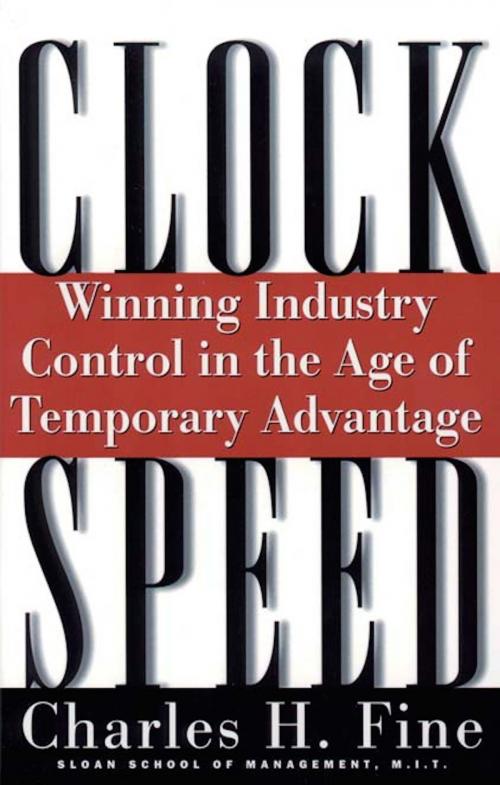| Author: | Charles H. Fine | ISBN: | 9780786722938 |
| Publisher: | Basic Books | Publication: | August 1, 2008 |
| Imprint: | Basic Books | Language: | English |
| Author: | Charles H. Fine |
| ISBN: | 9780786722938 |
| Publisher: | Basic Books |
| Publication: | August 1, 2008 |
| Imprint: | Basic Books |
| Language: | English |
In business today, all advantage is temporary. In order to survive-let alone thrive-companies must be able to anticipate and adapt to change, or face rapid, brutal extinction. In Clockspeed, Charles Fine draws on a decade's worth of research at M.I.T.'s Sloan School of Management to introduce a new vocabulary for understanding the forces of competition and making strategic decisions that will determine the destiny of your company, as well as your industry.Taking inspiration from the world of biology, Fine argues that each industry has its own evolutionary life cycle (or clockspeed”), measured by the rate at which it introduces new products, processes, and organizational structures. Just as geneticists study the fruit fly to gain insight into the evolutionary paths of all animals, managers in any industry can learn from the industrial fruit flies-such as Internet services, personal computers, and multimedia entertainment-which evolve through new generations at breakneck speed. Applying the lessons of the fruit flies to industries as diverse as bicycles, pharmaceuticals, and semiconductors, Fine illustrates how competitive advantage is lost or gained by how well a company manages dynamic web of relationships that run throughout its chain of suppliers, distributors, and alliance partners.Packed with revolutionary concepts and tools to help managers make key strategic decisions that affect current and future performance, Clockspeed shows, as no other book before it, how the ultimate core competency is mastering the art of supply chain design, carefully choosing which components and capabilities to keep in-house and which to purchase from outside.The consequences of faulty of visionary decisions can be enormous and dramatic. Witness the case of IBM in the early 1980s, when it outsourced key PC components to Microsoft and Intel, unleashing the Intel Inside” phenomenon and a complete restructuring of the computer industry. Going further, Fine sees the personal computer as merely a component in the vast information-entertainment industry, which evolves at speeds unimagined a few years ago. He uses this fruit fly” as well to peer into the future of industrial evolution and find practical advice for players in all industries, from automobiles to health care information systems.Clockspeed not only serves up some new laws” of value chain dynamics, but it also offers recommendations for achieving industry leadership through simultaneous product, process, and supply chain design. In challenging managers to think like corporate geneticists Clockspeed contributes the next creative leap in business strategy.
In business today, all advantage is temporary. In order to survive-let alone thrive-companies must be able to anticipate and adapt to change, or face rapid, brutal extinction. In Clockspeed, Charles Fine draws on a decade's worth of research at M.I.T.'s Sloan School of Management to introduce a new vocabulary for understanding the forces of competition and making strategic decisions that will determine the destiny of your company, as well as your industry.Taking inspiration from the world of biology, Fine argues that each industry has its own evolutionary life cycle (or clockspeed”), measured by the rate at which it introduces new products, processes, and organizational structures. Just as geneticists study the fruit fly to gain insight into the evolutionary paths of all animals, managers in any industry can learn from the industrial fruit flies-such as Internet services, personal computers, and multimedia entertainment-which evolve through new generations at breakneck speed. Applying the lessons of the fruit flies to industries as diverse as bicycles, pharmaceuticals, and semiconductors, Fine illustrates how competitive advantage is lost or gained by how well a company manages dynamic web of relationships that run throughout its chain of suppliers, distributors, and alliance partners.Packed with revolutionary concepts and tools to help managers make key strategic decisions that affect current and future performance, Clockspeed shows, as no other book before it, how the ultimate core competency is mastering the art of supply chain design, carefully choosing which components and capabilities to keep in-house and which to purchase from outside.The consequences of faulty of visionary decisions can be enormous and dramatic. Witness the case of IBM in the early 1980s, when it outsourced key PC components to Microsoft and Intel, unleashing the Intel Inside” phenomenon and a complete restructuring of the computer industry. Going further, Fine sees the personal computer as merely a component in the vast information-entertainment industry, which evolves at speeds unimagined a few years ago. He uses this fruit fly” as well to peer into the future of industrial evolution and find practical advice for players in all industries, from automobiles to health care information systems.Clockspeed not only serves up some new laws” of value chain dynamics, but it also offers recommendations for achieving industry leadership through simultaneous product, process, and supply chain design. In challenging managers to think like corporate geneticists Clockspeed contributes the next creative leap in business strategy.















